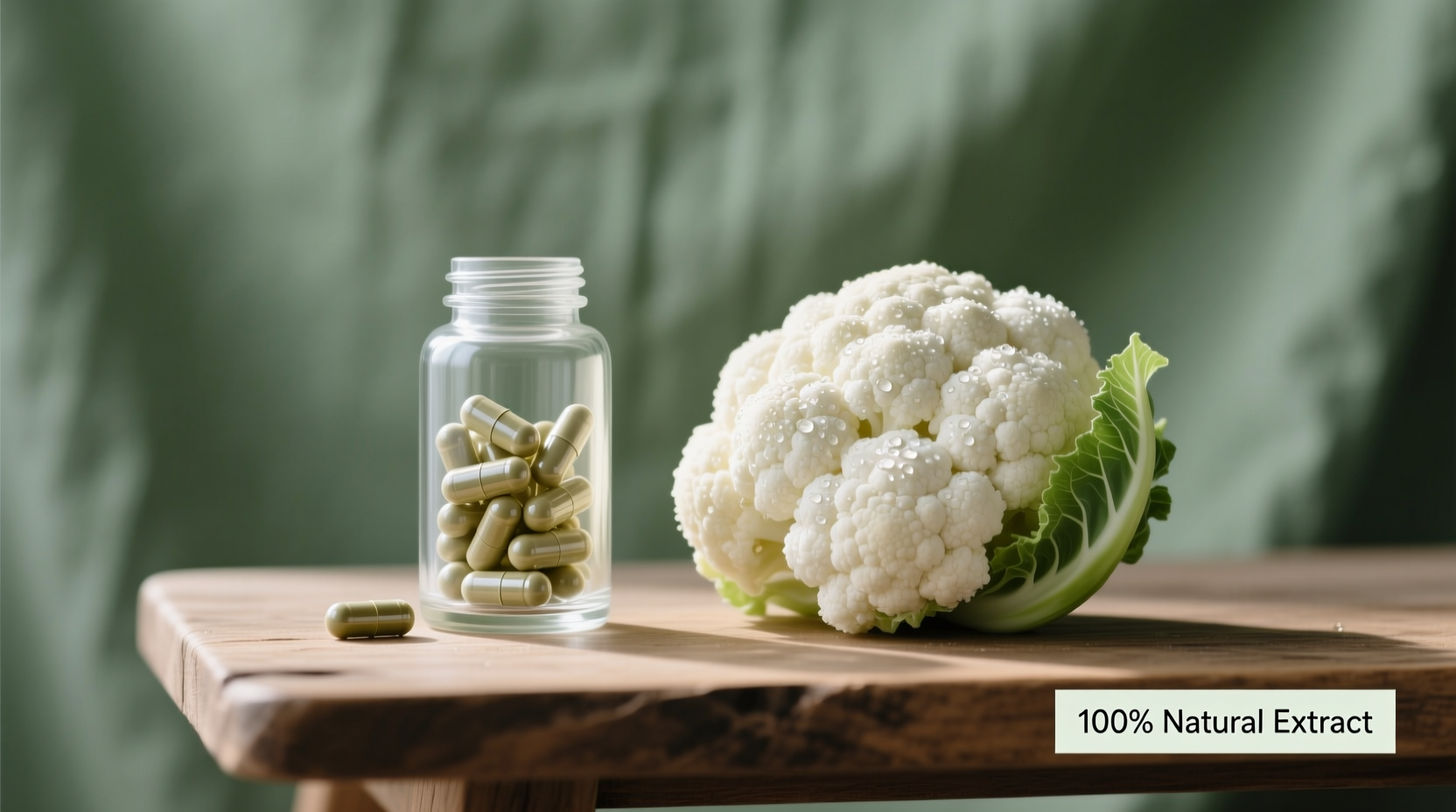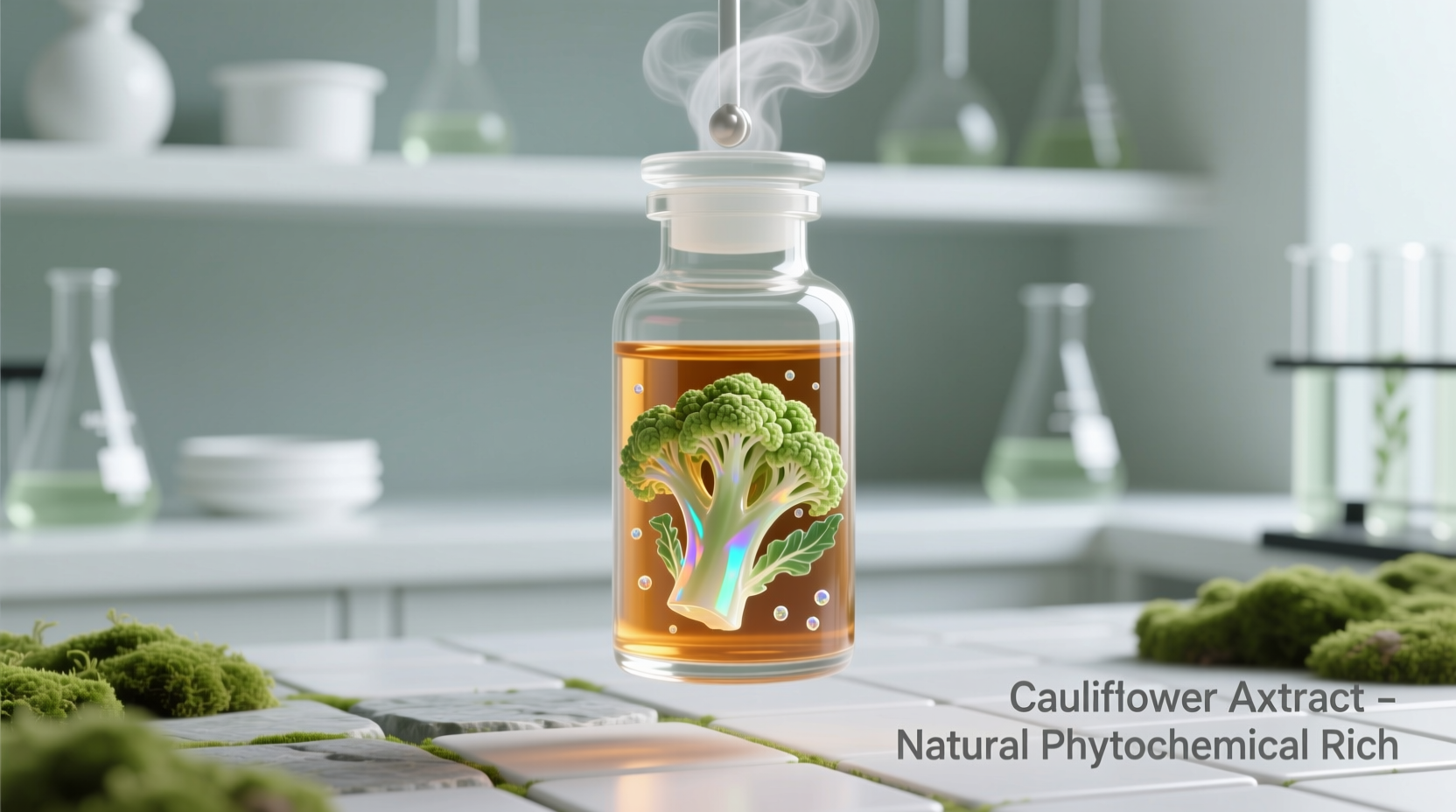Curious about cauliflower extract and whether it deserves a spot in your wellness routine? You're not alone. As interest in plant-based compounds grows, this cruciferous vegetable derivative has gained attention for its concentrated bioactive properties. Unlike simply eating cauliflower, the extract delivers specific compounds in more potent forms that may offer unique health advantages.
What Exactly Is Cauliflower Extract?
Despite the name, cauliflower extract isn't just powdered cauliflower. It's a specialized preparation that isolates and concentrates specific bioactive compounds through controlled extraction processes. The most valuable components include:
- Glucosinolates - sulfur-containing compounds that transform into active isothiocyanates
- Sulforaphane - the most studied breakdown product with potent biological activity
- Indole-3-carbinol - formed when glucosinolates break down during processing
- Phenolic compounds - natural antioxidants present in the vegetable
The extraction method significantly impacts the final product's composition. Water-based extractions preserve different compounds than ethanol-based methods, and some commercial products use specialized techniques to maximize sulforaphane yield. This explains why not all cauliflower extracts deliver equivalent benefits.
Scientific Evidence Timeline: From Discovery to Current Understanding
Understanding cauliflower extract requires examining how research has evolved over time. The scientific journey reveals both promising findings and important limitations:
- 1992 - Researchers at Johns Hopkins University first identify sulforaphane in cruciferous vegetables and note its potential biological activity
- 2000s - Laboratory studies demonstrate sulforaphane's ability to activate Nrf2 pathway, a cellular defense mechanism against oxidative stress
- 2010-2015 - Animal studies show promising results for inflammation reduction and cellular protection across multiple organ systems
- 2016-2020 - Early human trials focus on bioavailability, with studies confirming sulforaphane absorption from cruciferous vegetable extracts
- 2021-Present - Ongoing clinical trials examining specific applications, though large-scale human evidence remains limited
According to the National Center for Complementary and Integrative Health, while laboratory evidence is compelling, "human research on cauliflower-specific extracts remains preliminary, with most substantial evidence coming from studies of broccoli sprout extracts which contain similar compounds."

Practical Applications: How to Use Cauliflower Extract Effectively
If you're considering adding cauliflower extract to your routine, understanding proper usage makes all the difference. Here's what current research suggests:
Dosage Considerations
Unlike pharmaceuticals, standardized dosing for cauliflower extract isn't established. Research studies have used varying amounts:
- Most laboratory studies use sulforaphane concentrations equivalent to 30-150mg of cauliflower extract
- Human trials typically administer doses providing 10-50mg of sulforaphane daily
- No established upper limit exists, though doses above 200mg daily haven't shown additional benefits in limited studies
Forms and Bioavailability
Cauliflower extract comes in several formats, each with different absorption characteristics:
| Form | Average Sulforaphane Content | Relative Bioavailability | Best For |
|---|---|---|---|
| Capsules | 10-30mg per serving | Moderate | Daily consistent dosing |
| Powders | 15-40mg per serving | High (when mixed with water) | Those preferring flexible dosing |
| Standardized extracts | 25-100mg per serving | Variable | Targeted therapeutic applications |
| Fresh cauliflower | Natural variation | Low (without proper preparation) | General nutrition |
Research published in Phytotherapy Research indicates that combining cauliflower extract with a source of the enzyme myrosinase (found in raw cruciferous vegetables) significantly increases sulforaphane absorption. This explains why some products include broccoli seed powder, which naturally contains this activating enzyme.
When Cauliflower Extract Might Not Be Appropriate
While generally considered safe, cauliflower extract has specific limitations and contraindications you should know:
- Thyroid conditions - High intake of glucosinolates may interfere with thyroid function in susceptible individuals, particularly those with iodine deficiency
- Medication interactions - May affect how the body processes certain medications metabolized by cytochrome P450 enzymes
- Pre-surgery - Should be discontinued at least two weeks before scheduled surgery due to potential effects on blood sugar control
- Pregnancy and breastfeeding - Insufficient research to establish safety at supplement doses
The European Food Safety Authority notes that while dietary consumption of cruciferous vegetables is safe, "concentrated extracts may deliver compounds at levels significantly higher than typical dietary intake, warranting caution in specific populations."
Realistic Expectations: What the Science Actually Shows
It's crucial to separate marketing claims from scientific reality when considering cauliflower extract. Current evidence supports potential benefits in specific areas while showing limitations in others:
- Strongest evidence: Cellular antioxidant pathways activation, particularly through Nrf2 pathway modulation
- Moderate evidence: Temporary reduction in inflammatory markers in short-term human studies
- Preliminary evidence: Potential support for liver detoxification pathways
- Insufficient evidence: Direct weight loss effects, significant disease prevention in humans
A comprehensive review in Nutrients journal concluded that while "sulforaphane demonstrates compelling biological activity in preclinical models, human evidence remains limited to short-term biomarker studies rather than clinical outcomes." This distinction between biological plausibility and proven health benefits is critical for setting realistic expectations.
Choosing Quality Cauliflower Extract Products
With minimal regulation of supplement quality, selecting a reliable product requires careful consideration:
- Look for third-party testing verification from organizations like USP, NSF, or ConsumerLab
- Check for standardized sulforaphane content rather than just "cauliflower extract"
- Products containing myrosinase or instructions for proper activation show greater scientific understanding
- Reputable manufacturers provide batch-specific testing results upon request
The FDA's guidance on dietary supplements notes that "consumers should be cautious of products making disease treatment claims, as these violate regulatory guidelines for supplements." Stick with products making reasonable structure/function claims supported by available evidence.
Integrating Cauliflower Extract Into Your Wellness Approach
For most people, cauliflower extract works best as part of a comprehensive wellness strategy rather than a standalone solution. Consider these practical integration tips:
- Take with food to minimize potential digestive discomfort
- Morning dosing may align better with natural circadian rhythms of cellular defense pathways
- Combine with other vegetable-rich meals to enhance overall phytonutrient intake
- Track your experience for 4-6 weeks to assess personal response before continuing long-term
Remember that supplements work best alongside, not instead of, a nutrient-dense diet. As the Academy of Nutrition and Dietetics emphasizes, "whole foods provide complex matrices of nutrients and phytochemicals that work synergistically in ways supplements cannot replicate."
Frequently Asked Questions
How does cauliflower extract differ from eating regular cauliflower?
Cauliflower extract concentrates specific bioactive compounds like sulforaphane, delivering them in amounts difficult to achieve through dietary consumption alone. While one cup of cooked cauliflower contains approximately 10-20mg of glucosinolates, extracts can provide 50-100mg of concentrated compounds per serving, with enhanced bioavailability through specialized extraction methods.
Is cauliflower extract safe for long-term use?
Current evidence suggests cauliflower extract is generally safe for most adults when used at recommended doses for periods up to 12 weeks. However, research on long-term daily use beyond one year remains limited. Individuals with thyroid conditions or those taking certain medications should consult healthcare providers before extended use.
Can cauliflower extract help with inflammation?
Multiple short-term human studies show cauliflower extract can reduce certain inflammatory markers like C-reactive protein and interleukin-6. A 2022 review in Antioxidants journal noted "consistent evidence of anti-inflammatory effects in controlled settings," though the clinical significance of these reductions for long-term health outcomes requires further research.
What's the best time of day to take cauliflower extract?
Research suggests morning dosing may align better with natural circadian rhythms of cellular defense pathways. A study in Scientific Reports found that Nrf2 pathway activation (which sulforaphane influences) follows a daily rhythm with peak responsiveness in morning hours. Taking with breakfast also helps minimize potential digestive discomfort.
How long does it take to notice benefits from cauliflower extract?
Most research studies measuring biomarker changes show effects within 2-4 weeks of consistent daily use. However, noticeable subjective benefits vary significantly between individuals. Those seeking specific health outcomes should track their experience for at least 6-8 weeks while maintaining other healthy lifestyle factors that influence the same pathways.











 浙公网安备
33010002000092号
浙公网安备
33010002000092号 浙B2-20120091-4
浙B2-20120091-4